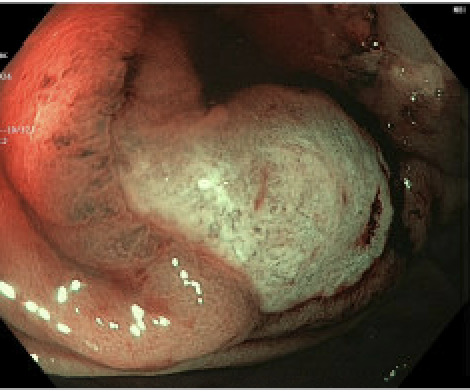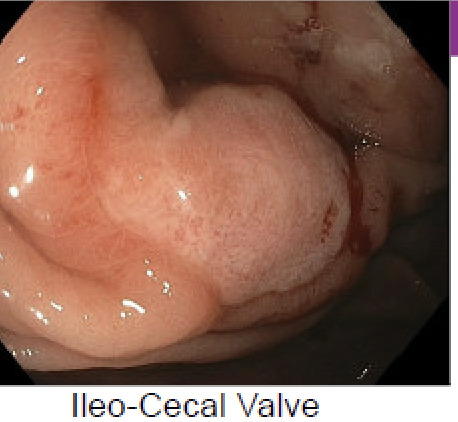Sunday Poster Session
Category: Small Intestine
P1960 - A Case of Ileocecal Ulceration from MMF-Induced Colitis in a Kidney Transplant Patient
Sunday, October 26, 2025
3:30 PM - 7:00 PM PDT
Location: Exhibit Hall
- AW
Abdul Wasay, MD
University of Tennessee
Knoxville, TN
Presenting Author(s)
Abdul Wasay, MD1, Nasir Notta, MD2, Rafia Waseem, MBBS3, Omar Tageldin, MD4
1University of Tennessee, Knoxville, TN; 2University of Tennessee medical center, Knoxville, Knoxville, TN; 3Shalamar Institute of Health Sciences, Knoxville, TN; 4university of tennessee medical center, knoxville, Knoxville, TN
Introduction: Mycophenolate mofetil (MMF) is a widely used immunosuppressant in transplant recipients. Gastrointestinal (GI) toxicity, particularly diarrhea, is among the most commonly reported adverse effects in MMF-treated patients.
Case Description/
Methods: A 56-year-old male with end-stage renal disease secondary to polycystic kidney disease, status post living donor renal transplant, presented with one week of progressive watery diarrhea. He also reported melena and hematochezia over the prior two days. MMF had been initiated 1.5 months earlier as part of his post-transplant immunosuppression regimen. After contacting his transplant team, his MMF dose was reduced, but symptoms persisted, prompting presentation to the emergency department.
Gastroenterology was consulted. Esophagogastroduodenoscopy (EGD) was unremarkable; however, colonoscopy revealed a 5 cm ulcer on the ileocecal valve ( Figure 1 and 2). Biopsies were negative for CMV but showed focal active colitis at the ileocecal valve and throughout the colon. Given these findings, MMF-induced colitis was strongly suspected. In coordination with the transplant team, MMF was discontinued, and the patient was transitioned to sirolimus and a prednisone taper.
At one-month follow-up, the patient reported resolution of diarrhea within days of stopping MMF. A follow-up colonoscopy was scheduled for one year later to assess ulcer healing and rule out inflammatory bowel disease.
Discussion: Immunosuppressed kidney transplant recipients are at increased risk for post-transplant colitis. When MMF-induced colitis is suspected, reduction or discontinuation of MMF may lead to symptom resolution, as no other therapy has proven effective. MMF or its metabolites are likely contributors. Diagnostic colonoscopy should be strongly considered in transplant patients with persistent diarrhea or GI symptoms to facilitate timely diagnosis and management.

Figure: Figure 1

Figure: Figure 2
Disclosures:
Abdul Wasay indicated no relevant financial relationships.
Nasir Notta indicated no relevant financial relationships.
Rafia Waseem indicated no relevant financial relationships.
Omar Tageldin indicated no relevant financial relationships.
Abdul Wasay, MD1, Nasir Notta, MD2, Rafia Waseem, MBBS3, Omar Tageldin, MD4. P1960 - A Case of Ileocecal Ulceration from MMF-Induced Colitis in a Kidney Transplant Patient, ACG 2025 Annual Scientific Meeting Abstracts. Phoenix, AZ: American College of Gastroenterology.
1University of Tennessee, Knoxville, TN; 2University of Tennessee medical center, Knoxville, Knoxville, TN; 3Shalamar Institute of Health Sciences, Knoxville, TN; 4university of tennessee medical center, knoxville, Knoxville, TN
Introduction: Mycophenolate mofetil (MMF) is a widely used immunosuppressant in transplant recipients. Gastrointestinal (GI) toxicity, particularly diarrhea, is among the most commonly reported adverse effects in MMF-treated patients.
Case Description/
Methods: A 56-year-old male with end-stage renal disease secondary to polycystic kidney disease, status post living donor renal transplant, presented with one week of progressive watery diarrhea. He also reported melena and hematochezia over the prior two days. MMF had been initiated 1.5 months earlier as part of his post-transplant immunosuppression regimen. After contacting his transplant team, his MMF dose was reduced, but symptoms persisted, prompting presentation to the emergency department.
Gastroenterology was consulted. Esophagogastroduodenoscopy (EGD) was unremarkable; however, colonoscopy revealed a 5 cm ulcer on the ileocecal valve ( Figure 1 and 2). Biopsies were negative for CMV but showed focal active colitis at the ileocecal valve and throughout the colon. Given these findings, MMF-induced colitis was strongly suspected. In coordination with the transplant team, MMF was discontinued, and the patient was transitioned to sirolimus and a prednisone taper.
At one-month follow-up, the patient reported resolution of diarrhea within days of stopping MMF. A follow-up colonoscopy was scheduled for one year later to assess ulcer healing and rule out inflammatory bowel disease.
Discussion: Immunosuppressed kidney transplant recipients are at increased risk for post-transplant colitis. When MMF-induced colitis is suspected, reduction or discontinuation of MMF may lead to symptom resolution, as no other therapy has proven effective. MMF or its metabolites are likely contributors. Diagnostic colonoscopy should be strongly considered in transplant patients with persistent diarrhea or GI symptoms to facilitate timely diagnosis and management.

Figure: Figure 1

Figure: Figure 2
Disclosures:
Abdul Wasay indicated no relevant financial relationships.
Nasir Notta indicated no relevant financial relationships.
Rafia Waseem indicated no relevant financial relationships.
Omar Tageldin indicated no relevant financial relationships.
Abdul Wasay, MD1, Nasir Notta, MD2, Rafia Waseem, MBBS3, Omar Tageldin, MD4. P1960 - A Case of Ileocecal Ulceration from MMF-Induced Colitis in a Kidney Transplant Patient, ACG 2025 Annual Scientific Meeting Abstracts. Phoenix, AZ: American College of Gastroenterology.
